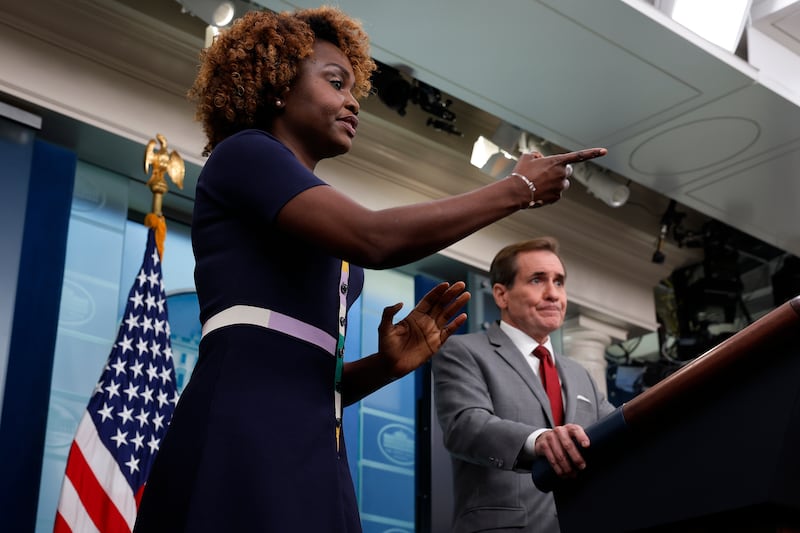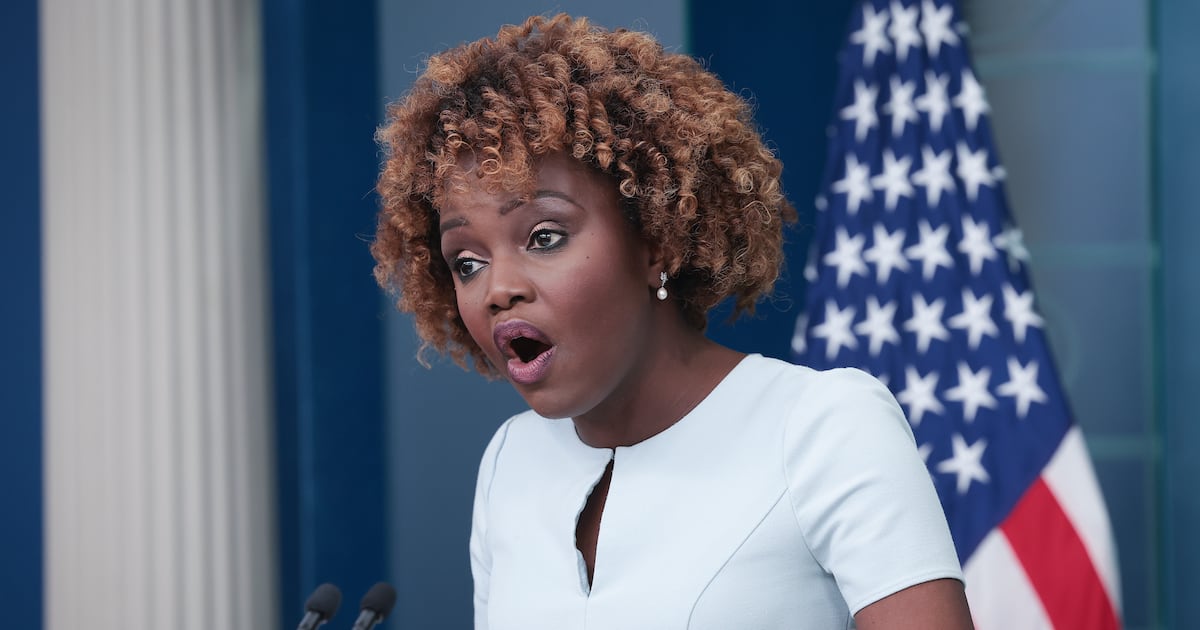When presidents leave the White House, they tend to remain in the public eye and imagination. But their press secretaries can simply vanish. When Karoline Leavitt was appointed as Donald Trump’s press secretary in January, she immediately made waves by becoming, at just 27, the youngest person ever appointed to that role, which she immediately began to perform with a steely, smiling brio that has made her a revered figure among the Maga fan base.
On Tuesday, Leavitt generated headlines when she decided to post a copy of a private text conversation with a senior Huffington Post journalist whom, she said, had it in for Trump and demanded that he “stop texting me with your disingenuous, biased and bulls**t questions”.
As it happened, Leavitt’s outburst deflected from competing headlines generated by her immediate predecessor, Karine Jean-Pierre.
The sudden return of Jean-Pierre, after a pronounced silence, was a reminder of how the day-to-day reality of the White House briefing room has changed beyond recognition. Jean-Pierre spent the critical months of last summer’s doomed re-election campaign defending and explaining president Joe Biden’s declining performance and poll numbers with an exasperated and weary patience.
The atmosphere in this year’s James Brady briefing room is fierier, with Leavitt in turns generous to questions flattering to her president and frequently contemptuous towards members of the mainstream media who challenge the administration’s narrative.
And it was to those critical weeks of last summer that Jean-Pierre returned as she made the rounds on the morning and evening talkshows to reflect on her decision to leave the Democratic Party and become a political Independent, which mirrors the title of her memoir, Independent: A Look Inside A Broken White House.
She returns to the spotlight with two critical messages. The first is that the Democratic Party is currently “too timid” in its response to the second coming of Donald Trump. And the second, more surprising, perspective is that she believes the elders in her former party essentially betrayed Biden in the devastating weeks revolving around his June debate debacle in Atlanta.
“I saw the president almost every day,” she said on NBC’s Morning Joe – which was Biden’s early-day news talkshow of choice when he was in the White House.
“On a daily basis. He was someone that was engaged. He would call me in the Oval Office and I would be worried because he would want to know what was in the press, he would want to know if we were pushing back on stories: he was someone who was on top of policy and understood history. He didn’t hide that he was ageing and he poked fun at that. But he is someone who is aware and engaged and he was active. And that’s what I saw.”
 Then-White House press secretary Karine Jean-Pierre speaks to reporters at the White House on October 31st, 2023. Photograph: Chip Somodevilla/Getty Images
Then-White House press secretary Karine Jean-Pierre speaks to reporters at the White House on October 31st, 2023. Photograph: Chip Somodevilla/Getty Images
It was precisely the same message that Jean-Pierre had persistently delivered to an increasingly dubious press corps during the flailing weeks of last summer. “He had a cold” was her official explanation in her July 2nd briefing, just five days after Biden’s catastrophic meltdown on the debate stage.
While she holds no animosity towards then vice-president and eventual candidate Kamala Harris, she is adamant that there could have been a different outcome than Biden’s ignominious exit, and the lonely closing months of his presidency.
“I had never seen this visceral reaction, and the attack on this man who objectively had a good three years when you think about the economy, how he responded to Covid, the student loans, expanding healthcare, you name it,” she told a sceptical Stephen Colbert on his talkshow on Monday evening.
“I saw every day a really ugly assault on someone who had 50-plus years of experience and who, again, objectively had done a good job as president of the United States. And it was heartbreaking to see that type of behaviour.”
Jean-Pierre’s defence of her former boss may be admirable and, arguably, splendid in its isolation. Colbert, normally a genial host to his guests, politely but firmly pushed back at the idea that the Democrats could have stuck with Biden after the debate collapse. He noted that when he had guested at an event that raised $25 million for Biden’s campaign just three months earlier, president Biden had been a different man.
Jean-Pierre’s version of events leaves her open to scathing reviews and condescension from leading Republican media personalities. “The Binder is back,” smirked Jesse Waters on his evening show while on the Megyn Kelly show, a guest quipped that Jean-Pierre was indeed an Independent: the last person in America who believes Biden could have remained in the race.
Jean-Pierre’s ascension to the White House role was a remarkable story of American possibility. The eldest daughter of Haitian immigrant parents, she recounted in her 2019 book the extreme challenges of her early years in New York, which involved essentially parenting her younger brother and sister while her parents worked six and seven days a week, sexual abuse by a cousin, difficulties of reconciling her sexuality with the mores of her strictly Catholic family and a suicide attempt brought on by a crushing academic disappointment, all before she finally found a path through political advocacy. She broke all sorts of glass ceilings through her appointment and famously announced at the outset of her first briefing: ‘I am a black, gay, immigrant woman, the first of all three of those to hold this position.”
Those characteristics reflected her tenacity while making her an obvious target for the Maga movement in the years when diversity, equity and inclusion frameworks were becoming its abiding obsession. Her unflagging loyalty to Biden leaves her at odds not just with the Maga Republican movement but among the many in the American liberal media who flagellated themselves for failing to be more probing on the matter of Biden’s mental acuity.
That lapse was something Leavitt addressed with characteristic bluntness at a White House press briefing on April 30th, when she directly implicated Jean-Pierre in what she described as one of the biggest cover-ups in Washington political history.
“[It would take] just two eyes and two ears to realise that Joe Biden was completely inept, was unfit to serve as president of the United States. Nobody in the legacy media, nobody in this city wanted to talk about it. In fact, I recall being on president Trump’s campaign and calling out Joe Biden’s cognitive decline and we were accused of manufacturing deep fakes. My predecessor accused us of manufacturing deep fakes from the White House podium when she knew and everybody in the White House knew the true status of Joe Biden’s physical and mental fitness. And the mainstream media allowed that cover-up to take place because they refused to dig for the truth. They tried to get the American people not to believe their own eyes.”
For Democrats and media members alike, there is a cold sting of truth about that observation. To the end, Jean-Pierre is adamant that she saw nothing, in her day-to-day dealings, that led her to suspect Biden was not still performing capably.
And the strange confluence of the former and current White House press secretaries in the headlines on the same day illuminated just how radical and transformative the shift in administrations has been.
During her round of media appearances on Tuesday, Jean-Pierre was shown an excerpt of Leavitt gaily denouncing the Democrats as a party whose “main constituency are made up of Hamas, illegal aliens and violent criminals”.
Jean-Pierre responded that the remark was “deplorable”.
“And I use that word on purpose,” she continued. “Because they don’t seem to understand – this is the Trump White House team – that they don’t work for just one man. They work for the American people.”
Whether Jean-Pierre has abided by that mantra in her remembrance of the critical weeks of Joe Biden’s campaign will be a matter of hot contention in the reviews of her book. But she continued: “The White House press secrecy is not about doing online trolling. It is an honour and a privilege to do that job and speak on behalf of the most powerful person in the world.”
On that last sentiment, and that alone, the former and current White House press secretaries may find common ground.
